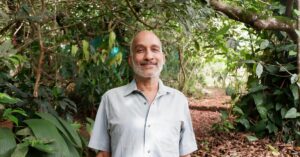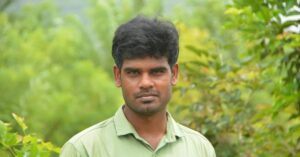Chennai Community Grow 25 Miyawaki Forests Across Tamil Nadu, Raise 65,000 Trees
Krishnakumar S from Chennai founded NGO Thuvakkam to increase green cover in the city and the surrounding districts. They now have a total of 1,800 volunteers
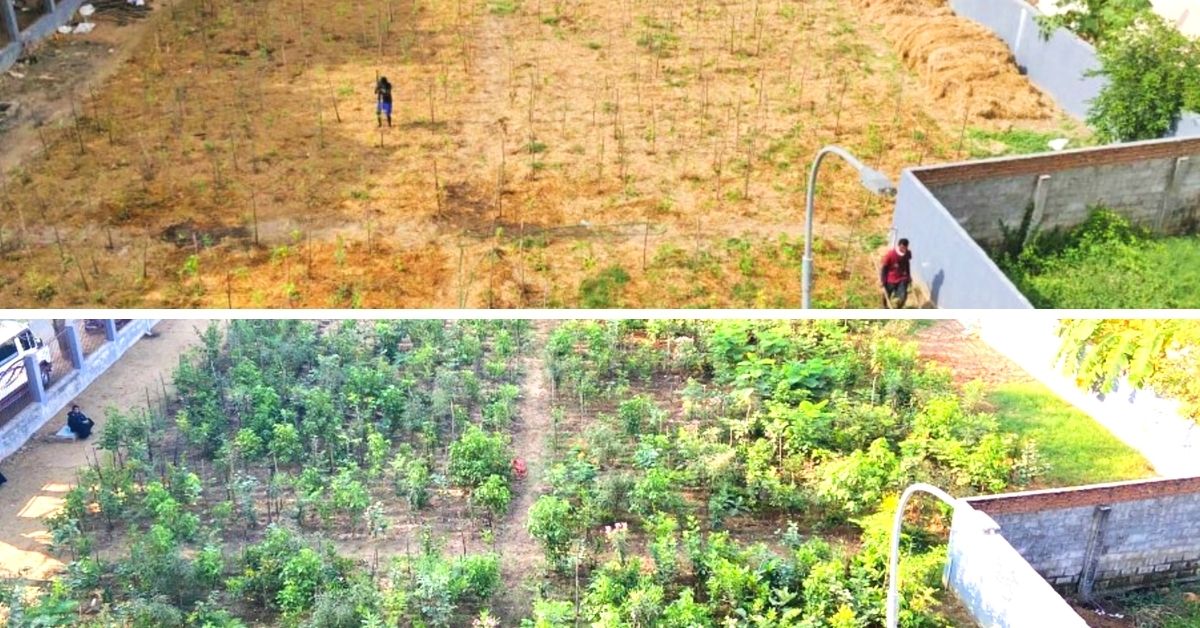
Japanese botanist Akira Miyawaki envisaged the concept of Miyawaki forests in the 1980s. The technique involves growing a dense forest in a small area with shrubs, trees and canopies. The densely planted vegetation grows exponentially in months rather than years, following their natural growth pattern.
But it is only in recent years that the concept has received wider acceptance. Many private groups, individuals, forest departments and government officials have adopted and experimented with the method that looks promising to mitigate the climate crisis.
Similarly, a Chennai-based group has created several green lungs in the city using the great Miyawaki’s concept. The citizens started tree plantation drives during their college days but the rapidly degrading forest cover in the city worried them. To find a speedy solution, they planted 25 Miyawaki forests with 65,000 native trees, covering 9.2 acres of land.
Growing a green army of 1,800 volunteers
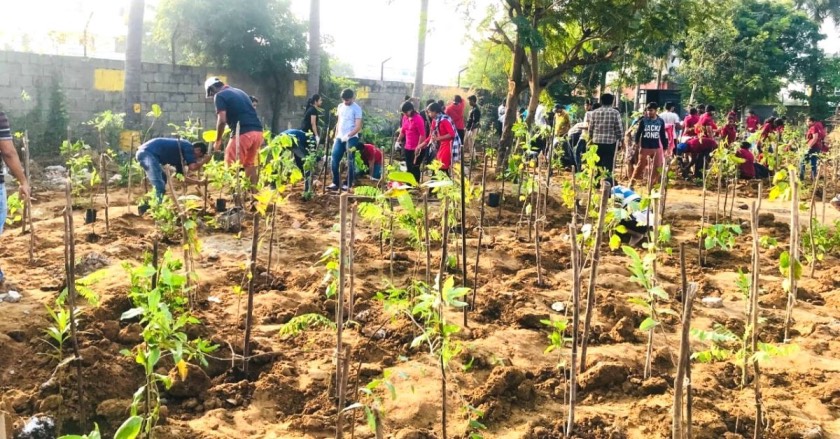
Through their NGO Thuvakkam, which means ‘the beginning’ in Tamil, they have created tiny green oases across the city and its outskirts, which also serves as a safe habitat for local biodiversity.
Walking through their journey so far, Krishnakumar S, founder and CEO of the NGO, says, “In 2014, during our final year of post-graduation in social work, six friends and I started tree plantation drives in our college campus and other public places. We all shared a common mindset about wanting to increase the greenery in our surroundings.”
The 27-year-old tells The Better India that the group of friends decided to practice before they could work towards inspiring others. “We identified empty spaces and sought permissions and started the plantation drives in the hopes to motivate others through our work,” he says.
Unfortunately, in 2016, cyclone Vardah hit Chennai, causing large-scale destruction, uprooting of trees, flattening homes, disrupting human lives and flooding the city. This devastation led to further loss of green cover, which disheartened the youngsters.
“There was a need to restore the lost green cover. Incidentally, we came across the Miyawaki forest technique and decided to experiment with it,” Krishnakumar says.
He adds that the group read articles, researched the techniques and decided to adopt them. “We sought permissions from the police department, local bodies and other government agencies, requesting to lend us the plots in the urban area. These spaces were empty and could serve as potential mini forests. The first such project was a 200-sq-feet area in a school,” he says.
Krishnakumar says the small area was used for experimentation and, if they succeeded, it would act as a demonstration to convince district administration and government officials in replicating the same.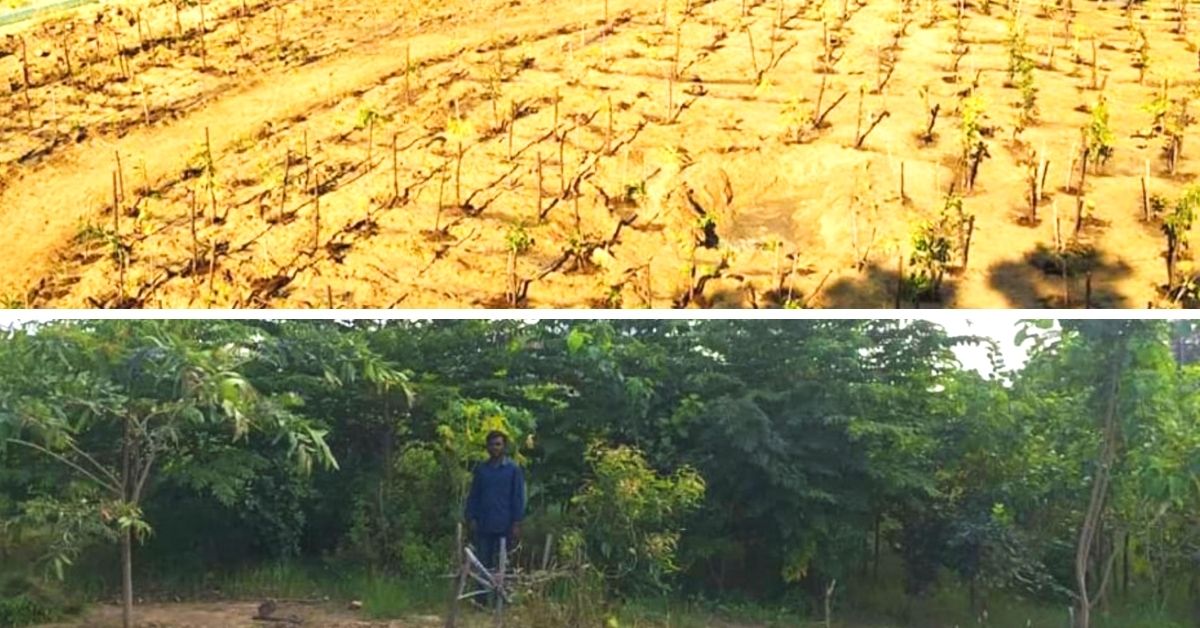
The idea was a success as the trees grew fast and achieved an impressive height. More people started approaching them and it became convenient for the group to get more areas for plantations.
However, there were many practical difficulties too. Krishnakumar says, “Identifying and seeking approvals to use the government and private land is difficult. Fewer people are willing to give up a space that will not have direct or monetary benefits to them.”
“The state also faced acute water shortages in the next few years, followed by drought in 2019 and 2020. It became difficult to water the plants and maintain them. We then requested residents around the plantations to spare some water and help the trees survive,” he recollects.
Their efforts, in turn, helped the community engage, contribute and become a part of the movement.
Over the years, the number of volunteers has grown to over 1,800, and the Thuvakkam team has grown to 14 members. However, out of the initial seven, only three founding members—Abhirami and Karthik Shiva and Krishnakumar—remain.
The plantations are visible in areas such as Tamil Nadu Housing Board, model school road, Sholinganallur, Anna institute of management in Adyar, blooming garden in Mugalivakkam and government multi-speciality hospital. Apart from 10 forests in Chennai, 15 others are stretched across Thiruvallur, Kanchipuram, Tuticorin, Vellore and other districts.
Parthiban Munusamy is a volunteer associated with the group since 2019, has worked on creating multiple forests. “There are butterflies, insects, swarms and birds that visit the urban pockets that have disappeared or become a rare sight. We plant native trees like neem, teakwood, Portia, Indian laburnum, gooseberry, Indian Beech tree and others, which reduce the surrounding temperatures and act as micro-climate zones,” he adds.
Parthiban says that government officials and locals appreciate our work, which offers them satisfaction in working for a social and environmental cause.
‘There is no planet B’

Krishnakumar says that the group does not follow a random method of choosing native trees and planting them but follow a systematic approach. “We check for geographical signs of tree biodiversity. We talk to locals who lived there for decades and elderly people who can serve as a reference in informing us about the varieties of trees that existed before they were replaced by concrete jungle,” he adds.
He adds that the drives are organised every weekend while also focusing on “maintenance and watering the trees”. “Ensuring their survival and healthy growth requires equal time and effort,” he adds.
However, experts advise caution on the blanket implementation of Miyawaki forests. “The concept of establishing such a dense mini-forest can suit an urban scenario where space is limited. Instead of parks or lawns that mostly have decorative plantations, the Miyawaki forests can offer a better alternative as it has reports of restoring some elements of biodiversity,” says Ketaki Ghate, a Pune-based ecologist working on land and biodiversity restoration.
Ketaki adds, however, it cannot be an ultimate solution to rejuvenate a degraded ecosystem or forest. “Naturally occurring forests do not have such a narrow gap between two trees nor are they evenly placed. However, the method is not recommended for large scale forestation. Additionally, creating Miyawaki forests involves the use of heavy fossil-fuel-powered equipment at times, which adds to the carbon footprint rather than helping to reduce it. Hence, the afforestation with the technique should be cautious and with an approach that mimics natural forest growth,” she says.
Krishnakumar says that their plans include introducing honey bee rearing in the established forests. They also aim to focus more on fruit varieties that can help local birds, animals and humans in forage and offer livelihood.
On a parting note, Krishnakumar says, “Our earth is a beautiful and incredible place, so let’s spend some time loving her a little extra every day. There is no planet B. We have to take care of the one we have. Let us become the change we wish to see and help people around the world and the environment.”
Edited by Yoshita Rao
This story made me
- 97
- 121
- 89
- 167
Tell Us More
We bring stories straight from the heart of India, to inspire millions and create a wave of impact. Our positive movement is growing bigger everyday, and we would love for you to join it.
Please contribute whatever you can, every little penny helps our team in bringing you more stories that support dreams and spread hope.






